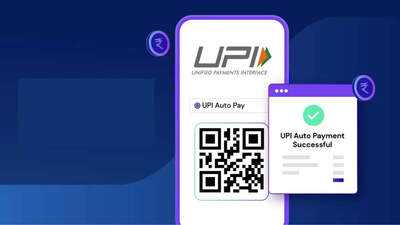Forget Paying Bills Manually? Here’s How RBI’s Autopay Rules Impact You
If you often miss paying your mobile, OTT, electricity, or insurance bills on time, the Autopay or E-Mandate feature can be a lifesaver. This facility ensures your bills are paid automatically on the due date — no reminders or manual payments needed.
However, the feature works strictly under the Reserve Bank of India (RBI) guidelines, which define how and when automatic payments can be processed. Let’s understand how Autopay works, its benefits, and the important rules every user must know.
What Is Autopay and How Does It Work?Autopay allows your bank to automatically deduct recurring payments from your account on a fixed schedule. You can enable it easily through your bank’s website, mobile app, or merchant platform (like OTT services, insurance providers, or electricity boards).
Autopay can be set up for recurring payments such as:
-
Mobile and DTH recharge
-
OTT subscriptions (e.g., Netflix, Disney+ Hotstar)
-
Insurance premiums
-
Electricity, gas, or water bills
Once activated, the system deducts the payment automatically without requiring manual input each month.
Types of Autopay MandatesRBI recognizes two kinds of Autopay setups:
Fixed Mandate: The payment amount stays the same every month — for example, a ₹399 OTT subscription.
Variable Mandate: The amount changes every billing cycle — for instance, your electricity or gas bill.
Once registered, the Autopay feature usually gets activated within seven days. If your bill is due within that period, you’ll need to make a manual payment first.
Charges and Balance RequirementsIf you’re using a debit card for Autopay, ensure there’s enough balance in your account. If the account has insufficient funds, the transaction will fail, and the bank may impose return charges — typically 2% of the transaction amount or a minimum of ₹500, whichever is higher.
RBI’s Framework for Autopay TransactionsThe RBI’s new Autopay guidelines, effective since October 1, 2021, aim to enhance security and prevent unauthorized payments. Here’s what the rules say:
-
For transactions up to ₹15,000, no OTP or extra verification is needed.
-
For transactions above ₹15,000, OTP confirmation is mandatory before processing.
-
For insurance premiums and mutual fund investments, the transaction limit is ₹1 lakh.
-
In the case of credit card bills, the Standing Instruction (SI) applies only up to ₹1 lakh. Payments beyond this limit require OTP verification each time.
RBI mandates AFA — Additional Factor Authentication in the following cases:
-
When setting up a new recurring payment above ₹15,000.
-
Every time a transaction exceeds ₹15,000, the system will seek OTP approval before deduction.
-
No transaction can be processed without the customer’s consent.
Additionally, the bank sends a pre-transaction notification at least 24 hours before every Autopay deduction. The message includes an opt-out link, giving customers the freedom to pause or cancel the payment if needed.
What Information Is Needed for E-Mandate Registration?While registering for Autopay, you’ll need to provide basic details, which may vary depending on the service provider:
-
Consumer or account number (e.g., electricity or policy number)
-
Payment limit (especially for variable mandates)
-
Contact information (for SMS or email confirmations)
Only merchants and payment platforms authorized by RBI can offer E-Mandate facilities.
What Happens If Your Card Is Lost or Blocked?If your debit or credit card is lost, stolen, or temporarily blocked, all Autopay transactions linked to it will automatically pause. You must manually delete the old E-Mandate from the merchant or bank portal and re-register once you receive your new card.
In such cases, the bank is not responsible for missed payments — it’s the customer’s duty to ensure bills are paid on time.
Key Takeaways-
Autopay helps you make regular payments automatically, but it’s governed by strict RBI rules.
-
Transactions up to ₹15,000 don’t need OTP; above this limit, OTP verification is mandatory.
-
For insurance and mutual funds, the limit extends to ₹1 lakh.
-
Pre-transaction alerts and opt-out options ensure transparency and security.
-
Lost or blocked cards automatically disable linked mandates.
RBI’s Autopay framework strikes a balance between convenience and security. While it saves users from the hassle of missed payments, it also ensures that every transaction remains fully authorized and transparent. For those relying on multiple subscriptions or recurring bills, Autopay can be a smart digital tool — provided it’s used responsibly and within RBI’s defined limits.
You may also like

Last bid to solve mystery of boy, three, who disappeared 80 years ago

Assam's Eviction Drive: Clearing Forest Land and Controversy Surrounding Encroachment

PM's silence on Trump's remarks, unresolved China ties major concerns: Jairam Ramesh ahead of Parliament's Winter Session

Panic in Poland as residents abandon country for Spain

How to double your holiday allowance in 2026 by booking certain days off







